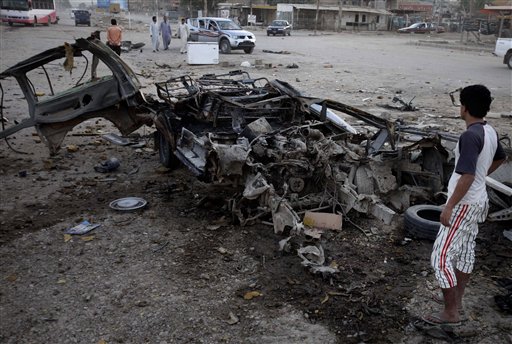
People inspect the aftermath of a car bomb explosion that hit a cafe in the northeastern suburb of Husseiniyah in Baghdad, Iraq, Wednesday, Aug. 7, 2013. Experts say things could get even worse, as political deadlock with no end in sight feeds a worsening security situation in a country only a few years removed from a sectarian war. AP PHOTO/KARIM KADIM
BAGHDAD—A coordinated spate of bombings across Baghdad capped Iraq’s bloodiest Ramadan in years, with more than 800 people killed in spiralling violence that a paralyzed government has failed to stem.
Experts say things could get even worse, as political deadlock with no end in sight feeds a worsening security situation in a country only a few years removed from a sectarian war in which tens of thousands of people died.
“If the Iraqi political parties get together, and agree with each other, discuss things, try to be flexible and reach decisions, I think it will be better,” Kurdish MP Mahmud Othman said.
“But if things stay as they are—parties not meeting, not making common decisions, everyone putting blame on others—then of course it will get worse.”
Of those two options, Othman said: “I think the second is likely.
“I don’t see any real sign of will that they are ready to meet. … They are running away from responsibility.
“The whole conflict is political, and at the same time it’s sectarian. And that feeds into the security situation.”
Ramadan in Iraq typically sees an increase in violence because, analysts say, militants see their attacks as having religious justifications.
But even with that in mind, the holy Muslim fasting month was especially bloody this year, with at least 816 people killed according to an AFP tally.
Attacks struck a wide variety of targets, mostly in Baghdad and north of the capital.
The latest deadly attacks, including a shooting and bombings at a policeman’s home, killed 17 on Wednesday.
Officials frequently point to the bloodshed in neighboring Syria as sowing instability in Iraq, but a long-standing political stalemate is also widely blamed for allowing militants to gain room on the ground to carry out attacks and promote their goals.
In addition to worsening security, the government has largely failed to deliver on basic services such as electricity and clean water, and little in the way of landmark legislation has been passed since 2010 elections.
While the cabinet is ostensibly labelled one of national unity, comprising each of the country’s main political blocs, rival political leaders often publicly criticize each other and trade barbs on a variety of issues.
Prime Minister Nuri al-Maliki is routinely accused of agglomerating power, and he retorts that his political opponents are in bed with foreign powers.
Merely symbolic gestures
Only symbolic gestures, such as a June 1 meeting of political leaders, have taken place, and few tangible measures have been taken to address the stand-off.
Little respite is expected before elections due next year.
“Political leaders are the main ones responsible for the bad situation because they are the ones who control security,” said Ihsan al-Shammari, a Baghdad-based political analyst.
“They are also responsible for other parts of life like corruption and unemployment.”
Shammari warned that any improvement in the political or security situation was “far off,” and voiced worry that levels of violence could in fact increase ahead of elections, which are due to be held in April 2014.
“I think there will be an increase in the level of violence in the coming days or months, with the coming of the next election,” he said.
The elections are widely seen as the next major opportunity when Iraq’s political deadlock can be shaken up, as changes to power structures within and between parties could force alterations in how they interact.
Until then, however, violence is unlikely to abate, analysts say, as at least 17 more people were killed on Wednesday.
“Things were very bad before Ramadan, and the underlying factors driving that violence have not changed as a result of Ramadan,” said John Drake, an Iraq analyst for risk consultancy AKE Group.
“That’s still there.”—Prashant Rao